The first page opened with a poem titled “For the Boys,” followed by a description of “Loafing” observed by the Man-on-the-band-stand among the boys on campus. There was also a feature, “200,000,000" that tallied up the time it would take to become as rich as Mr. Vanderbilt. Page two reported severe weather in Michigan, a request for a lost…
Haskell Indian School
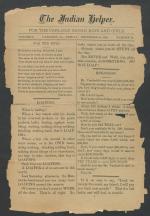
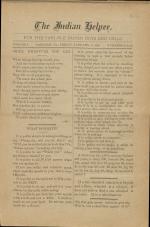
The first page opened with a poem titled “Smile Whenever You Can," followed by a lesson titled, "What Is Polite?" and a description of the life cycles of certain mammals. Page two featured the "Forty-Ninth Congress" civics lesson comparing government to the Indian school’s debating clubs in which Congress would be debating the question of…
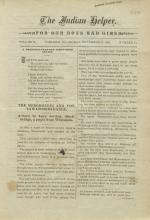
The first page opened with a poem titled "A Fourteen-Year-Old Girl's Good Advice," followed by an article called "The Menomonees and Pottawatomies Dance: A Story by Lucy Jordan, Stockbridge, a pupil from Wisconsin," that told of an 1882 visit by dancers to her home agency in Keshena, Wisconsin. Page two included an offer of photographs for new…
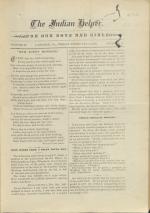
The first page opened with the poem, "New Every Morning" by Susan Coolidge, followed by "Good Words from a Blind Young Man," which was a typewritten letter sent by Joseph Link, student of the Institution of the Blind, to Charles Wheelock (Oneida). There was also an article reprinted from the Truckee (Cal.) Republican, titled "Indian…
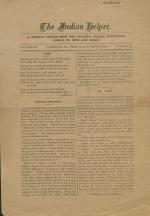
The first page opened with a poem, "Dare," followed by a story, "Engines and Boys," that reported the arrival by train of the new fire engine called "Uncle Sam." Then came a piece entitled, "Be Neat," on the importance of being neat and orderly. It continued on page four. Page two reported the experience of the four girls who visited the White…
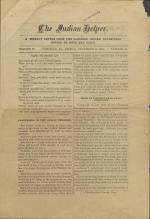
The first page opened with a poem titled “How To Make Up,” followed by an article reprinted from The Sabbath School Visitor titled “Playthings of the Indian Children.” Next came a letter from Nancy Cornelius (Oneida) titled “Items of Interest From Nancy Cornelius,” which was sent from the Training School for Nurses at Hartford, Connecticut and…
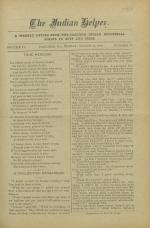
The first page began with a poem titled, “True Heroism,” followed by a fictional conversation among two Indian School students, Tom and Phil as reported by the Man-On-The-Band-Stand. In the moralizing story, continued on the fourth page, Phil sets a good example by keeping the Outing System rules, while Tom broke the rules and tainted the…
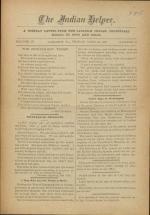
The first page opened with a poem "The Printer-Boy Tramp” by Will Carleton, followed by “Encouraging Prospects” about Luther Kuhns at the Pawnee Agency. Next came “A Man Who was not Afraid to Work” on how General Washington set an example for his corporal. Also on the page was an article titled “Easter Eggs in Washington.” Page two contained a…

The caption reads: Haskell Institute, Lawrence, Kansas.
The reverse side contains a note from John A. Ortego to Oscar H. Lipps from Lawrence, Kansas on June 5, 1915. It is likely that John A. Ortego is the student also known as Aniseto Ortego.

Richard Henry Pratt responds to a letter from the Bureau of Indian Affairs regarding a request from a student from the Haskell Institute to transfer from Carlisle. In addition, Pratt discusses a request from a missionary at the Quapaw Agency to send students to Carlisle.
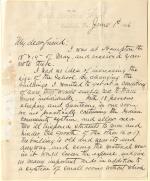
Superintendent Richard Henry Pratt writes to Doctor Cornelius Rea Agnew regarding plans for new and renovated buildings at Carlisle. Pratt states that he does not intend to take on more students, but rather to create a more individualized training environment. He compares Carlisle's Congressional funding to Congressional funding for…
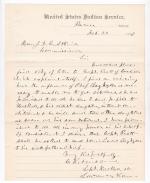
Charles Robinson, the Superintendent of the Haskell Institute, forwards a copy of a letter he sent to Richard Henry Pratt regarding a request to return Louis Bayhylle due to his father's illness. Robinson states that Baptiste Bayhylle is essential for him to recruit students for Haskell at the Pawnee Agency but he will only assist if his son is…
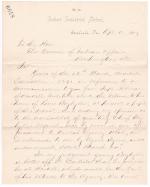
Richard Henry Pratt responds to the Office of Indian Affairs regarding the return of Louis Bayhylle and his transfer to the Haskell Institute. Pratt notes that Bayhylle may return to his Agency at the end of the year but should likely remain at school for an additional period due to his young age. In addition, Pratt writes that Carlisle would…
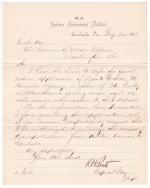
C. H. Grover requests to have Peter Curley, a member of the Pottawatomi Nation, enrolled at the Carlisle Indian School. Grover notes that Curley was previously a student at the Haskell Institute and was considered an excellent shoe maker.
Richard Henry Pratt forwards the request to the Office of Indian Affairs with a note that he favors…
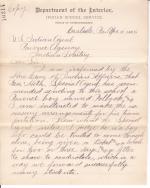
Charles Robinson, Superintendent of the Haskell Institute, forwards a letter from Richard Henry Pratt requesting from the U.S. Indian Agent at the Pawnee Agency transportation for Pollock to the Carlisle Indian School. In the letter E. C. Osborne appends a note to the letter in forwarding the letter to Robinson that Pollock is now at Haskell…
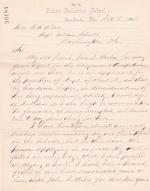
Richard Henry Pratt provides a recommendation for John D. Miles to fill the position of Superintendent of the Haskell Institute. Pratt writes that Miles had the best schools of any agency he dealt with and that Miles would be the best man for the job. Pratt ends by noting that only someone who is willing to reside at the school and give it…
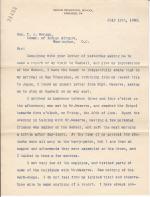
Richard Henry Pratt in compliance with a request from the Office of Indian Affairs regarding the Haskell Indian School. Pratt notes that upon his arrival in San Francisco from his recent trip to Japan he received a letter from Haskell Superintendent Charles Francis Meserve asking him to stop at Haskell. Pratt explains that his interactions were…
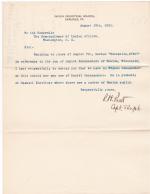
Richard Henry Pratt responds to an Office of Indian Affairs letter regarding a request from Daniel Schanandore to return his son Wilson Schanandore. Pratt states that Wilson is not a student at Carlisle nor do they have any sons of Daniel Schanandore at the school. Pratt suggests Wilson is likely at the Haskell Institute.
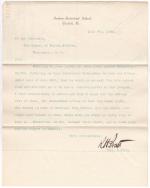
Richard Henry Pratt responds to an Office of Indian Affairs regarding a note from Supervisor Richardson of the Pawnee Agency. Pratt informs the Office that Richardson has written him that the three Pawnee girls who wanted to go to Carlisle changed their minds and were then taken to Haskell.
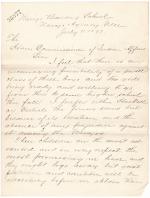
G. H. Wadleigh, Superintendent of the Navajo Boarding School, informs the Office of Indian Affairs that a small party of students would be interested in transferring to either Haskell or Carlisle. Wadleigh indicates Haskell would be better because of its location and lack of prejudice against it among the Navajo. He further states that it will…
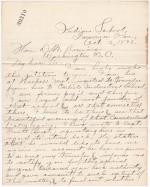
Former student Abe Somers requests to transfer from the Haskell Institute to re-enroll at the Carlisle Indian School.
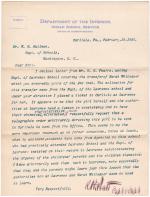
Richard Henry Pratt forwards a letter from H. B. Peairs, Acting Superintendent of the Haskell Institute, informing him that Sarah Whitedeer no longer consents to the transfer to Carlisle. Pratt requests that W. N. Hailmann order the transfer anyway due to prior instances of Haskell ordering Carlisle students to be transferred.
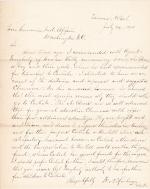
W. N. Hailmann recommends the Office of Indian Affairs authorize the Hoopa Valley Agent to transfer to the Carlisle Indian School four students.
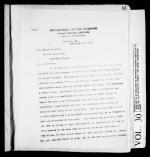
Richard Henry Pratt writes to former student Flora Campbell at the Haskell Institute, expressing concern that he has not heard from her and encouraging her to be mindful of her behavior.
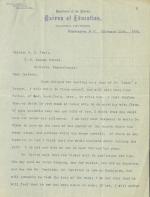
Rev. Sheldon Jackson responds to a letter from Richard Henry Pratt which shared concerns about former student Flora Campbell, who was now employed at Haskell, and acknowledges receipt of a copy of a letter Pratt had written to Campbell. He discusses some arrangements for train tickets for a visit.
